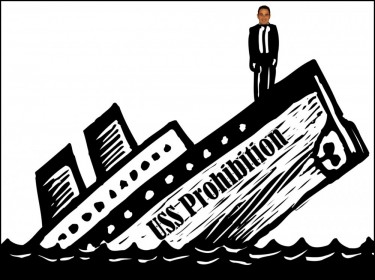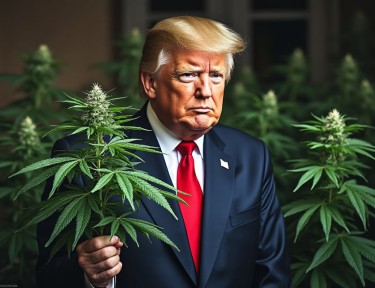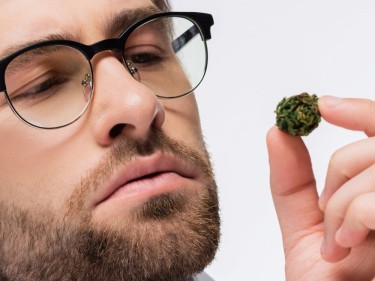Cannabis News
The Scrooge of Cannabis Takes on VP Harris with Reefer Madness
Published
12 months agoon
By
admin
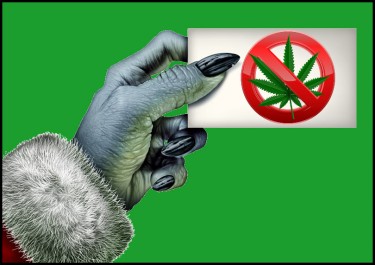
Reginald vs The Scourge – Analyzing Sabet’s latest Reefer Madness
As an advocate for personal responsibility, bodily autonomy and freedom, I have made it my mission to challenge the stance of prohibition and counteract the misinformation that fuels it. The right of individuals to make informed choices about what they put into their own bodies is fundamental. Yet there are still vocal prohibition advocates who spread falsehoods and rely on fearmongering rather than facts. It’s crucial that we critically examine their claims to determine if there is any real scientific and logical basis behind them.
For years, one of the loudest voices on the prohibition side has been Kevin Sabet and his organization SAM (Smart Approaches to Marijuana). Sabet recently co-authored an opinion piece in The Hill arguing against rescheduling cannabis and painting a dire picture of the supposed harms of legalization. But do his arguments hold up to scrutiny?
In this article, we’re going to take a close look at the claims made in Sabet’s latest letter, titled “Kamala Harris is gravely wrong about rescheduling marijuana.” We’ll see if there is factual merit behind the rhetoric, or if it’s simply drug war propaganda fueled by ideology and vested interests.
To be clear, I hold no love for Vice President Harris given her history as a prosecutor who gleefully sent cannabis users to jail as California Attorney General. It pains me to have to defend her recent comments in favor of rescheduling. But intellectual honesty demands calling out Sabet’s flawed arguments, even if Harris and I are strange bedfellows on this issue.
With over 90% of Americans now in favor of legal access to cannabis, at least for medical use, Sabet’s prohibitionist views represent an increasingly marginalized fringe. Yet he still garners attention as the media’s go-to “anti-pot” voice. So join me as we dissect his latest screed and I make the case for why his Reefer Madness mindset belongs in the dustbin of history.
As always, I approach this not as a blind defender of cannabis, but as someone who believes policy should be grounded in science, reason and human rights. Let’s see if Sabet’s arguments meet that bar.
In order to save you all time from reading the Letter, I have gone through some of their arguments and come up with a response to each point. Mainly, I challenge their logic, their conclusion, and whether or not they have a bias in a particular arena.
Let’s go!
“First, we should address what Harris left unsaid. Since his election, Biden has demonstrated that criminal justice reform is possible without commercializing today’s industrialized, high-potency THC drugs or legalizing dangerous psychoactive drugs.”
While President Biden has taken some symbolic steps towards cannabis reform, such as pardoning low-level federal possession offenses, his overall impact on the legal status of cannabis has been sorely lacking. The glaring elephant in the room is that cannabis remains a Schedule I substance under federal law, a classification reserved for drugs with “no currently accepted medical use and a high potential for abuse.”
This scheduling is not only scientifically baseless, but a cruel joke to the millions of patients who rely on cannabis as a safer, less addictive alternative to prescription opioids and other pharmaceuticals for treating conditions like chronic pain, PTSD, epilepsy, and the side effects of chemotherapy. The medical applications of cannabis are extensively documented, with FDA-approved cannabinoid medications like Epidiolex and Marinol just the tip of the iceberg.
Moreover, the notion that cannabis belongs in the same category as heroin in terms of abuse potential is laughable when compared to the legal and widely available drug alcohol, which is far more toxic and addictive by any objective measure. The continued Schedule I status of cannabis is a relic of the racially and politically motivated War on Drugs, not a reflection of scientific reality.
While incremental criminal justice reforms are welcome, they don’t address the root problem of cannabis’ egregious misclassification, which perpetuates stigma, stifles research, and keeps the industry in a legal gray area. If the Biden administration is serious about righting the wrongs of the drug war and embracing an evidence-based approach, it must prioritize the descheduling of cannabis altogether.
Sadly, these glaring contradictions and the need for substantive change seem to be among the many things left “unsaid” by our political leaders, even as public opinion and state-level legalization increasingly leave federal prohibition behind. It’s time for the Biden administration to match its rhetoric with bold action and consign cannabis prohibition to the dustbin of history where it belongs.
“There was no one representing social justice advocates, scientists and public health experts concerned about the harms of marijuana commercialization. Many of these experts have studied the socioeconomic effects of lax marijuana policies, including the fact that pot shops are often concentrated in and target poorer and non-white communities on purpose, much like menthol cigarettes target Black communities.”
Kevin Sabet and his cohorts at SAM love to posture as champions of social justice, but their actions and affiliations tell a different story. It’s high time we called out their cynical exploitation of marginalized communities as a cover for their true agenda – protecting the profits of the rehab industry that funds them.
Let’s be clear: Sabet’s organization has deep financial ties to the very same rehabilitation clinics that benefit from the court-ordered treatment of cannabis users caught up in the criminal justice system. These are the same clinics that are often in cozy partnership with the state, creating a perverse incentive to keep cannabis criminalized and the treatment beds filled. So when Sabet sheds crocodile tears over the impact of legalization on disadvantaged populations, forgive me if I’m a bit skeptical of his sincerity.
If Sabet and friends truly cared about social justice, they’d be working to dismantle the racist and classist drug war policies that have devastated communities of color, not fighting to preserve them. They’d be advocating for restorative justice, expungement of past convictions, and equitable access to the legal cannabis industry, not scaremongering about the supposed harms of legalization.
I’m all for an honest, evidence-based discussion about the public health implications of cannabis policy. Sabet claims to have science on his side? Great – let’s see him square off against the countless medical professionals and researchers who have attested to the therapeutic potential and relative safety of cannabis compared to legal substances like alcohol and tobacco. I’ll bring my experts, he can bring his, and we’ll see whose arguments hold up to scrutiny.
Of course, no policy is without trade-offs and the transition to a legal, regulated cannabis market is no exception. There will undoubtedly be some unforeseen consequences and challenges along the way. But when we weigh the evidence objectively, it’s clear that the overall societal benefits of ending prohibition – from reducing incarceration to generating tax revenue to weakening the illicit market – far outweigh the potential downsides.
So spare me the social justice smokescreen, Kevin. It’s time to have an honest conversation about cannabis policy, one grounded in science, compassion, and a genuine commitment to righting the wrongs of the failed war on drugs. The American people are ready for change – the question is, are you?
“While Biden should be praised for his stance opposing legalization and supporting expungement and removing penalties, rescheduling marijuana would be an abandonment of his efforts to keep drugs off our streets”
Your claim that rescheduling cannabis would undermine efforts to “keep drugs off our streets” would be laughable if the consequences of this thinking weren’t so tragic. News flash: after decades of prohibition and trillions of dollars wasted on enforcement, drugs are more readily available than ever. If you don’t believe me, just ask any high schooler how long it would take them to score some molly or a vape pen. Spoiler alert: probably less time than it takes to get a pizza delivered.
The painful reality is that the War on Drugs has been an abject failure by every conceivable metric. Despite the tireless efforts of the DEA and other law enforcement agencies, the illicit drug trade continues to thrive, with devastating consequences for public health and safety. Overdose deaths are at record highs, cartels are raking in billions, and marginalized communities bear the brunt of the violence and incarceration that prohibition fuels.
It’s time to face the facts, Kevin. We can’t arrest and incarcerate our way out of this crisis. The only way to truly get drugs under control is to bring them out of the shadows and into a system of strict regulation and oversight. By legalizing and regulating substances like cannabis, we can ensure that adults have access to safe, lab-tested products while keeping them out of the hands of minors. We can redirect law enforcement resources toward more serious crimes, and use the tax revenue generated by legal sales to fund education, prevention, and treatment programs.
This isn’t some radical, untested idea – it’s the approach that’s already working in countries like Portugal, where decriminalization has led to dramatic reductions in overdose deaths, HIV transmission rates, and drug-related crime. It’s the direction that more and more U.S. states are moving in with cannabis, as they recognize the failure of prohibition and the benefits of regulation.
Don’t just take my word for it. Let’s look at the data from states that have already legalized cannabis. Teen use has remained stable or even declined, opioid prescriptions and overdoses have fallen, and billions in tax revenue have been generated for public services. The sky hasn’t fallen, Kevin – in fact, by most measures, the situation has improved.
So please, spare us the fear-mongering about legal cannabis flooding the streets with drugs. The streets are already flooded, and it’s prohibition that’s keeping the cartels in business. It’s time for a new approach, one grounded in harm reduction, public health, and respect for individual liberty. The mission of the drug war has failed – it’s time to evolve. The question is, Kevin, are you ready to join us in the 21st century, or will you keep clinging to the failed policies of the past?
“Drug scheduling is not a harm index. It is a legal term that categorizes drugs based on medical benefit and potential for abuse. From a scientific basis, marijuana fails to meet the statutory requirements for any schedule other than Schedule I.”
Kevin, your claim that cannabis meets the criteria for Schedule I would be almost impressive in its sheer audacity if it weren’t so easily debunked by even a cursory glance at the scientific literature and real-world evidence.
Let’s start with the FDA-approved cannabinoid medications Epidiolex and Marinol, which are prescribed for conditions like epilepsy and chemotherapy-induced nausea. How exactly do these fit into your narrative that cannabis has “no currently accepted medical use”? Are you suggesting that the FDA is in on some vast stoner conspiracy?
And that’s just the tip of the iceberg when it comes to the medical applications of cannabis. Countless studies have documented its efficacy in treating chronic pain, muscle spasms, anxiety, PTSD, and a host of other conditions. In states with medical cannabis programs, patients are using it as a safer alternative to prescription opioids, with many able to reduce or eliminate their use of these highly addictive and potentially deadly drugs.
But hey, don’t take my word for it – just ask the millions of people worldwide who have found relief and improved quality of life through medical cannabis. Or consult the numerous medical organizations, like the American Nurses Association and the American Public Health Association, that have endorsed rescheduling or descheduling cannabis to facilitate research and patient access.
The notion that there is no evidence for cannabis’ medical utility is not just factually incorrect – it’s a slap in the face to the patients and healthcare professionals who have seen its benefits firsthand. It’s an ideologically driven talking point that has no place in a serious discussion about science and public health.
So please, Kevin, spare us the Schedule I nonsense. It’s a relic of the racist and politically motivated war on drugs, not a reflection of scientific reality. If you’re going to engage in this debate, at least have the intellectual honesty to grapple with the evidence instead of regurgitating long-debunked prohibitionist myths.
“It is also more dangerous than people think. In fact, the drug has undergone a transformation in its addictive potential. Today’s marijuana is nothing like Woodstock-era weed.”
Oh boy, here we go again with the “today’s pot is not your grandpa’s woodstock weed” scaremongering. Kevin, I hate to break it to you, but this tired talking point is the definition of reefer madness 2.0.
Yes, cannabis potency has increased over the years, thanks in large part to prohibition driving cultivation underground and incentivizing the production of more concentrated products. But the idea that higher THC content automatically equates to increased danger is overly simplistic and ignores the way cannabis is actually consumed in the real world.
The average THC content of popular strains in legal markets hovers around 14% – undoubtedly stronger than the schwag of yesteryear, but a far cry from the 90%+ concentrates that prohibitionists love to wave around to scare soccer moms. And let’s be real, even the most potent bud isn’t going to turn someone into a homicidal maniac. That’s the kind of hysterical nonsense that even the most die-hard D.A.R.E. graduates have trouble believing these days.
What Sabet and his ilk fail to grasp is that cannabis consumers are not mindless slaves to ever-increasing THC levels. People titrate their dose and use a variety of consumption methods to achieve their desired effect, whether that’s relief from pain and anxiety or a social buzz. Regular consumers also develop tolerance over time, meaning that what might be an uncomfortably intense experience for a newbie is just another Tuesday for a seasoned smoker.
Now, this is not to say that cannabis is harmless or that there aren’t risks associated with excessive use, particularly for young people with developing brains. Some folks will undoubtedly develop problematic relationships with cannabis, just as they do with alcohol, gambling, and Fortnite.
But the solution to mitigating those risks is not prohibition and criminalization – we already know how well that works out. It’s legalization, regulation, education, and harm reduction. By bringing cannabis out of the shadows and into a system of age restrictions, potency limits, and mandatory labeling, we can create guardrails to encourage responsible use while respecting the liberty and agency of adults to make their own choices.
And spare me the false equivalence between cannabis and alcohol, Kevin. If you’re going to play the Schedule I card, let’s at least be consistent. By any objective measure, alcohol is far more dangerous and addictive than cannabis – yet I don’t see you crusading to bring back the 18th Amendment. It’s almost as if your selective outrage and disdain for “psychoactive drugs” only applies to the ones you personally disapprove of. Funny how that works, isn’t it?
But hey, I get it. Admitting that you’ve hitched your wagon to a losing battle must be a bitter pill to swallow. But the American people are waking up to the absurdity of cannabis prohibition, and no amount of reefer madness redux is going to put that genie back in the bottle. It’s time to get with the times, Kevin. The future is green whether you like it or not.
SOURCE:
https://thehill.com/opinion/criminal-justice/4559148-kamala-harris
-is-gravely-wrong-about-rescheduling-marijuana/
https://www.marijuanamoment.net/house-gop-committee-urges-opposition-to-marijuana
-banking-bill-saying-gateway-drug-causes-violence-depression-and-suicide/
https://www.marijuanamoment.net/only-one-out-of-ten-americans-wants-to-
keep-marijuana-totally-illegal-pew-poll-shows/
https://www.pewresearch.org/politics/2024/03/26/most-americans-favor-legalizing
-marijuana-for-medical-recreational-use/
MORE ON KEVIN SABET AND SAM, READ ON…
KEVIN SABET IS GOING DOWN ON THE SINKING SHIP OF WEED PROHIBITION
You may like
-


Couple arrested with large amounts of weed and molly
-
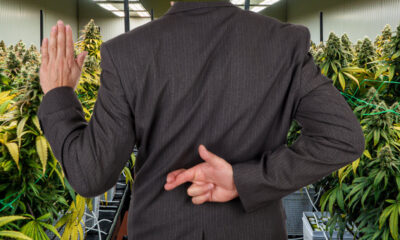

The Cannabis Rescheduling Ruse – White House Says No Action Planned on Cannabis Reform, Hate to Say I Told You So!
-
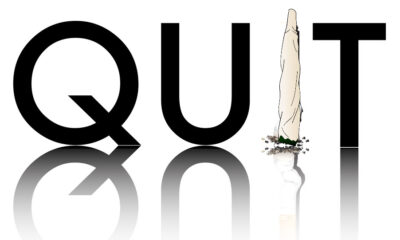

Why Quitting Alcohol or Weed Won’t Heal the Pain That Caused You to Start Using Them in the First Place
-


Oklahoma voters could weigh in on adult-use marijuana legalization in 2026
-


Karma Koala Podcast 247: Speaking with Dr. Natalie Corthésy senior lecturer university of West Indies & Enrico Bonadio professor of law City St George’s University of London about their forthcoming Edward Elgar title, “Intellectual Property and Cannabis”
-


MJBizCon offers speakers chance to share cannabis insights, shape industry
Cannabis News
The Cannabis Rescheduling Ruse – White House Says No Action Planned on Cannabis Reform, Hate to Say I Told You So!
Published
1 day agoon
April 5, 2025By
admin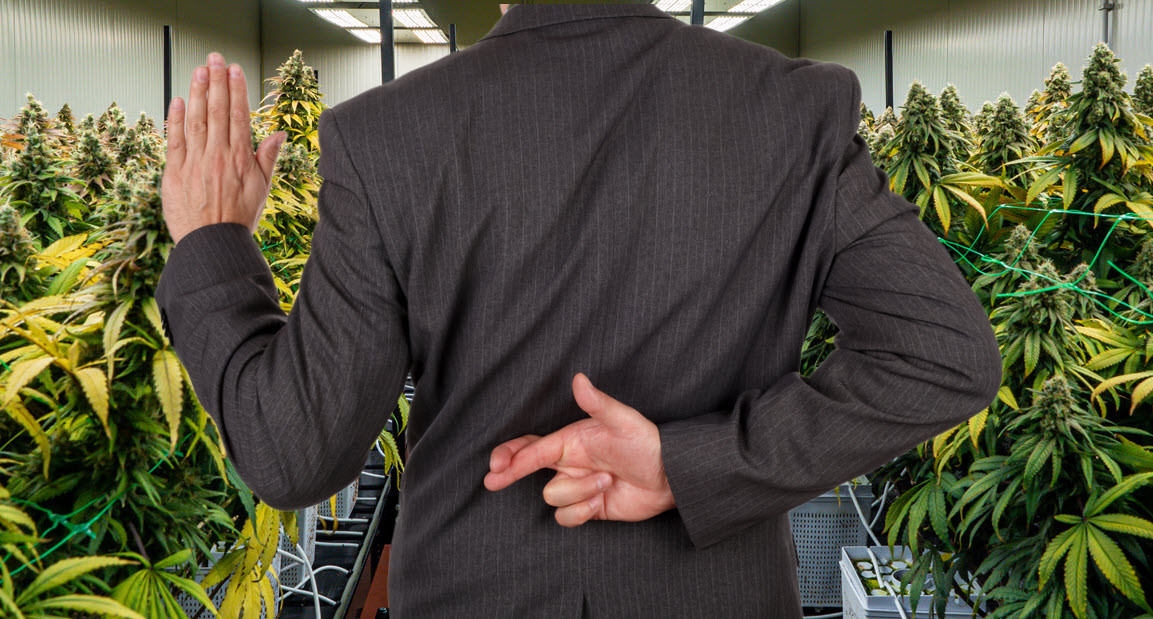
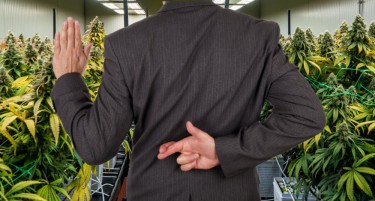
The Rescheduling Ruse: Why I Told You So
In a move that surprised absolutely no one who’s been paying attention, the White House recently announced it has “no action planned” on marijuana reform. Yes, the same marijuana reform that President Trump enthusiastically backed on the campaign trail just weeks before Election Day.
The writing was on the wall all along, folks. I’ve been telling you for months that the much-hyped rescheduling of cannabis from Schedule I to Schedule III was nothing more than political theater – a carefully choreographed dance designed to generate headlines without delivering substantive change. And here we are, with yet another administration putting cannabis reform on the back burner while millions of Americans continue to live under the shadow of failed prohibition policies.
Don’t get me wrong – I’m not here to play political favorites. This isn’t a red versus blue issue. The Biden administration dangled the same carrot, initiating a rescheduling process that conveniently stalled due to “complications” with DEA hearings. Different players, same game.
Let’s take a step back and examine what’s really happening here, because the truth about cannabis reform in America is both simpler and more complex than most people realize.
Trump’s pre-election cannabis conversion was quite the spectacle, wasn’t it? Suddenly, the man who selected Jeff “Good People Don’t Smoke Marijuana” Sessions as his first Attorney General was voicing support for rescheduling, banking access, and even Florida’s legalization initiative.
But as CNN recently reported, “no action is being considered at this time.” The honeymoon didn’t even last through the first dance. The administration’s priorities lie elsewhere – immigration, government spending, foreign policy – while cannabis reform gets shelved alongside countless other campaign promises.
Interestingly, CNN did note that Trump and his transition team attempted to include cannabis banking protections in December’s government funding resolution. This behind-the-scenes effort suggests at least some genuine interest in the issue, but hardly qualifies as the bold reform millions of voters were led to expect.
This pattern should feel familiar. The Biden administration made similar overtures, with the president announcing pardons for federal marijuana possession offenses and directing an administrative review of cannabis scheduling. That process dragged on for over a year, with the DEA repeatedly delaying final action. Biden got the headlines; cannabis users got nothing.
The harsh reality? Cannabis reform makes for good campaign fodder, but terrible governance priorities. Once elected, the political calculus changes dramatically. The motivation to deliver evaporates when the votes are already counted and the special interests start calling in their favors.
At the heart of this perpetual delay lies the Drug Enforcement Administration – an agency whose very existence depends on the continuation of the drug war. Expecting the DEA to facilitate cannabis reform is like asking a turkey to vote for Thanksgiving.
The DEA has mastered the art of procedural obstruction. Under Biden, they scheduled hearings, requested extensions, and effectively ran out the clock. Under Trump, they appear poised to do absolutely nothing, perhaps not even bothering with the pretense of consideration.
The pattern becomes clearer when you look at Trump’s cabinet picks. His nominee to lead the DEA, Terrance Cole, has previously voiced serious concerns about marijuana dangers and linked its use to higher suicide risk among youth. His HHS general counsel nominee, Mike Stuart, is so staunchly anti-cannabis that prohibitionist groups openly celebrated his selection.
Even Robert F. Kennedy Jr., who previously supported legalization, has walked back his stance since being confirmed as HHS Secretary, stating he’s “worried about” high-potency marijuana and deferring to the DEA on rescheduling.
When you stack the regulatory deck with cannabis skeptics, you’ve telegraphed your true intentions no matter what you said on the campaign trail.
Here’s what I’ve been saying all along: meaningful cannabis reform was never going to come from the White House, regardless of who occupied it. The DEA will never willingly relinquish its power, and politicians will always prioritize easier wins over controversial reforms.
The only real path forward is through Congress completely removing cannabis from the Controlled Substances Act. Full stop. No rescheduling, no administrative reviews, no half-measures. Cannabis needs to be descheduled entirely, returning regulatory authority to the states where it belongs.
But while we push for that goal, the real revolution continues on two fronts.
First, state-by-state legalization marches forward. Despite federal inaction, 38 states have medical marijuana programs, and 24 states plus DC have legalized adult use. Each new state that joins the ranks weakens prohibition’s grip and demonstrates the failure of federal policy.
Second, and perhaps more powerful, is what I call “mass defiance of an unjust law.” Every day, millions of Americans peacefully consume cannabis in direct violation of federal law. They grow it in their homes, share it with friends, and build communities around it. This civil disobedience at scale is perhaps the most effective weapon against prohibition.
The federal government simply doesn’t have the resources to enforce cannabis prohibition against a population that increasingly rejects it. When enough people break an unjust law, the law itself becomes unenforceable.
I hate to say I told you so, but… I told you so. The rescheduling promise was never going to materialize, regardless of who won the White House. It was a political mirage, designed to attract voters while requiring minimal commitment.
But don’t mistake my cynicism about federal action for pessimism about our cause. Cannabis reform is happening – it’s just happening from the ground up rather than the top down. Every state that legalizes, every municipality that decriminalizes, every voter who demands change, and yes, every person who peacefully consumes despite prohibition is part of this unstoppable movement.
The lesson here is simple: Don’t put your faith in presidential promises or administrative processes. Put it in your local ballot initiatives, your state legislators, and your own power to reject unjust laws through peaceful non-compliance.
Cannabis prohibition is dying, not because presidents commanded it, but because we the people have decided it must end. That’s the real power in our democracy – not the fleeting promises of politicians, but the sustained will of the citizens.
So next time a candidate promises to fix cannabis laws, remember this moment. Then go out and fix them yourself, one vote, one state, and one act of principled defiance at a time. That’s how real change happens in America, and that’s how we’ll finally end cannabis prohibition once and for all.
CANNABIS UNDER TRUMP 2.0, READ ON…
Cannabis News
Why Quitting Alcohol or Weed Won’t Heal the Pain That Caused You to Start Using Them in the First Place
Published
1 day agoon
April 5, 2025By
admin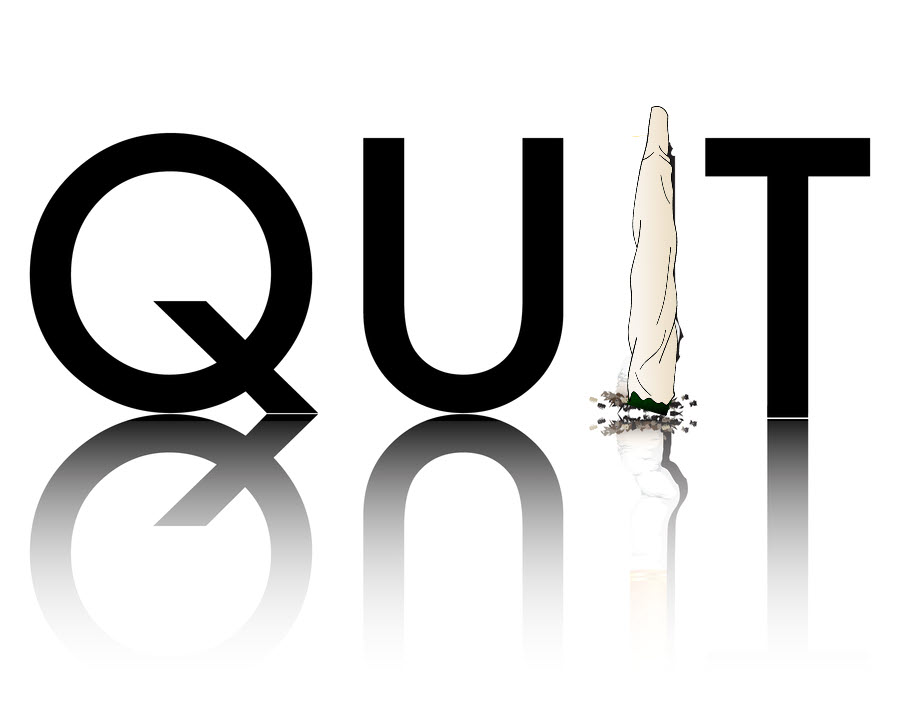
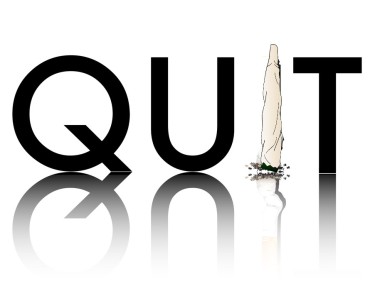
Quitting Won’t Fill the Hole
There’s a pervasive notion that floats around recovery circles—this idea that once you kick your habit, everything will magically fall into place. The clouds will part, the birds will sing, and suddenly life will be worth living again. While it’s true that being addicted to a “thing,” whether substance or act, eventually tallies up consequences that weigh heavy on our souls, the math isn’t quite as simple as “remove addiction, add happiness.”
I’ve watched countless cannabis enthusiasts (and addicts of all stripes) fall into this trap. They sit in circles, eyes gleaming with hope as they declare, “If I could only quit, then everything would be better…” But they’re missing something crucial—their addiction isn’t the source of their discontent; it’s merely a symptom of something deeper.
Addiction, at its core, is a means of dealing with something we cannot name or are desperately trying to avoid. It’s the bandage we slap over a wound without cleaning it first. The cannabis, the alcohol, the gambling, the endless scrolling—these aren’t the disease itself but rather the body’s misguided attempt at self-medication.
Here’s the uncomfortable truth that most recovery programs don’t emphasize enough: if you don’t do the real healing, even if you manage to white-knuckle your way through quitting one addiction, you’ll inevitably find something else to cover that gaping wound. Maybe you’ll trade joints for junk food, or bongs for binge-watching. The face of the addiction changes, but the role it plays remains constant.
Let’s take a deeper dive into this cycle and why simply quitting isn’t enough to truly heal.
First, we must acknowledge that when it comes to pain and addiction, everyone’s journey is unique. What feels like an insurmountable mountain to you might be a speed bump to someone else, and vice versa. There’s no universal scale for suffering, which makes navigating these waters all the more complex.
However, across all these varied experiences, there’s a common trap I’ve seen ensnare countless individuals—what I call the “If/Then Fallacy.” It’s the belief that one singular thing is the root cause of all our discomfort. This is where addicts often say, “If I can only kick this addiction, then my whole life would be better.” While this may seem logical on paper, it’s a deeply flawed perspective.
The real issue rarely lies with the substance or behavior itself but with something deeper—something the addiction is helping us avoid or cope with. Whether it’s trauma, depression, anxiety, or simply the existential weight of being human in an increasingly disconnected world, there’s usually a wound beneath the bandage.
Furthermore, the “If/Then” scenario places your healing, joy, and accomplishments in a fictional future state. “If I stop smoking weed, then I’ll finally have the motivation to start that business.” “If I quit drinking, then my relationship will improve.” These statements create a dangerous binary—because when the “if” is satisfied but the “then” doesn’t materialize, where does that leave you? Often, it leads to “If that didn’t work, then what’s the point of trying anything?”
This thinking creates a perfect setup for relapse or substituting one addiction for another. After all, if quitting didn’t magically transform your life as promised, why continue to deny yourself that temporary relief?
If you’ve been considering quitting cannabis or any other addiction, and you believe it to be the sole source of your unhappiness, I strongly urge you to reconsider your framework. The cannabis, or your relationship with it, is likely just a mask for your real pain. If you want to truly liberate yourself from the burden of addiction, you need to develop the capacity to sit with your pain, examine it, and cultivate joy despite it—not because it disappeared.
This article was inspired by a post I came across while scrolling through Reddit the other day—one of those moments where someone’s raw honesty stops you mid-scroll. A 32-year-old man shared that after smoking cannabis and drinking 4-6 beers daily for nearly his entire 20s, he had finally managed to quit both. No cannabis for almost six months, no alcohol for three. A significant achievement by any measure.
Yet instead of the transformation he expected, he felt “MISERABLE.” Despite taking medication for ADHD and anxiety, and despite removing substances that conventional wisdom says should improve his mental health, he felt no positive change. In fact, he felt worse, as if he’d “stopped doing things that were fun for me, or at least making life bearable.”
His post ended with a plea that broke my heart: “Is this just how I’m going to feel now? Does this go away eventually?”
This redditor’s experience perfectly illustrates the point—even when you manage to power through the physical and psychological challenges of quitting an addiction, your mental and spiritual state doesn’t necessarily transform as a result. His baseline remained exactly the same, perhaps even dipping lower without the chemical crutches he’d relied on for so long.
When you’re changing habits but not experiencing the promised benefits, it’s a clear sign that your discomfort or pain isn’t primarily coming from the substance. The cannabis or alcohol wasn’t creating your misery—it was masking it, providing temporary relief from a deeper issue that remains unaddressed.
This is something we all must consider when facing our compulsions. If you find yourself in a situation where you want to stop a behavior but simply can’t, it might be time to look deeper. Ask yourself, “Why do I do this activity?” And then ask “why” five more times, each answer digging a layer deeper toward the root cause.
Why do I smoke cannabis every night? Because it helps me relax. Why do I need help relaxing? Because my mind races with anxiety. Why does my mind race with anxiety? Because I’m worried about my future. Why am I worried about my future? Because I don’t feel secure in my career path. Why don’t I feel secure in my career path? Because I never really chose it—I fell into it. Why does that bother me? Because I feel like I’m not living authentically or pursuing my true passions.
Once you’ve excavated to this deeper level, you can begin to address the root causes directly. Perhaps the issue isn’t the cannabis at all, but rather that you need to reassess your career path or find meaning outside of work. Without this deeper work, quitting the substance becomes an exercise in willpower rather than healing.
Your addiction isn’t necessarily the root cause of your issues—it’s often just the most visible symptom. If you’re depressed, anxious, or feeling lost, it’s not primarily because of the substance; it’s because of something deeper that the substance helps you manage or forget temporarily.
Unless you actually do the internal work on these matters—examining your pain, seeking appropriate mental health support, rebuilding healthy relationships, finding meaning and purpose—no matter what you quit or how long you stay “clean,” you’ll likely find yourself seeking new ways to shield yourself from the pain. The prison isn’t cannabis or alcohol; it’s the unhealed wound those substances help you endure.
If you’re struggling right now, it’s absolutely important to seek help. That might mean therapy, support groups, or speaking with a healthcare provider about potential underlying mental health conditions that need treatment. But alongside that external support, commit to the honest and difficult work of looking inward. Ask yourself what you’re truly trying to avoid when you reach for that joint or that drink.
At the end of the day, we all have our struggles. If yours involves cannabis at this point in your life, there’s no judgment here. I’ve been there myself. But I’ve also learned that true healing rarely comes from simply removing something from your life—it comes from adding understanding, self-compassion, and addressing the real gaps in your heart and mind that the substance was never capable of filling in the first place.
The void can’t be filled by quitting. But quitting might just give you the clarity to finally see what the void truly needs.
QUITTING CANNABIS, READ ON…
THE STONER’S GUIDE TO QUITTING WEED – WAIT, WHAT…WHY?
Cannabis News
Scientists Now Think That One Compound in the Cannabis Plant Can Replace All Opiates
Published
3 days agoon
April 3, 2025By
admin

Which Cannabis Compound Do Scientists Think Can Replace Opiates?
…And Why This Is Important
Opiates are a type of pharmaceutical drug that’s been made from the opium poppy plant. While it’s somewhat a ‘natural’ substance that’s been extracted from the fibers and sap of the opium poppy plant, these are extremely dangerous sedatives that act on the central nervous system. However, there are completely synthetic opioids as well, which are manufactured entirely in laboratories.
Famous examples of well-known and widely-used opiates today include heroin, codeine, and morphine. They all work similarly, binding to the brain’s opioid receptors and users feel a drastic reduction in pain. It also causes users to feel euphoric, drowsy, or sleepy. Common side effects include constipation and nausea.
Because opiates are powerful for dulling one’s pain perceptions, they have become commonly prescribed by doctors and hospitals for pain relief. That said, opiates have become one of the world’s most addictive, dangerous, and fatal drugs – and you can get prescribed it right by your very own physician. Repeated use of opiates can easily lead to dependence and addiction, and eventually consuming high doses can drastically slow down breathing, and cause brain damage, or even death.
Since doctors still keep prescribing opioids, this has resulted in the deadly Opioid Epidemic, which has killed thousands of people. It’s a worrisome public health crisis, most especially because of fentanyl, an illegally manufactured opioid which is said to be 50 times more potent than heroin.
Could The Answer To The Opioid Epidemic Lie In Cannabis…Terpenes?
The past few years have shown that cannabis legalization is critical for surviving the opioid epidemic, and reducing overall opioid consumption.
The results of a recent research paper, which builds on past studies conducted by Dr. John Streicher, who is a member of the Comprehensive Center for Pain and Addiction, reveals fascinating findings. According to Streicher, cannabis terpenes were found to provide relief in inflammation models as well as on neuropathic pain caused by chemotherapy.
For the study, Streicher and his research team analyzed 4 kinds of terpenes that are found in mid to high levels in Cannabis sativa plants: linalool, geraniol, beta-caryophyllene, and alpha-humulene. They discovered that each terpene produced significant pain relief among mice subjects with fibromyalgia and post-operative pain, and among the terpenes, geraniol was found to be the most powerful.
“Our research is showing that terpenes are not a good option for reducing acute pain resulting from an injury, such as stubbing your toe or touching a hot stove; however, we are seeing significant reductions in pain when terpenes are used for chronic or pathological pain,” he said. “This study was the first to investigate the impact of terpenes in preclinical models of fibromyalgia and post-operative pain and expand the scope of potential pain-relieving treatments using terpenes,” Streicher said.
Cannabis terpenes are the compounds responsible for the aromatic profile of each strain; they are located in the plant trichomes. Not only do they contribute to each strain’s unique flavor and odor, but they also have valuable therapeutic and medicinal benefits. There are around 150 kinds of terpenes known today, though in the entire plant world, there are known to be some 20,000 terpenes.
Understanding the therapeutic benefits of terpenes is incredibly valuable also because they don’t contain THC (tetrahydrocannabinol), the compound in marijuana that gets you high.
“With fibromyalgia, there isn’t much of an understanding of what the pain state is, and there are not a lot of great options for treating it,” explains Streicher. “Our findings show that terpenes may be a viable treatment option for fibromyalgia pain, which could potentially have a large impact and make a difference for an under-treated population.”
Other Studies
This is not the first time that cannabis terpenes have been found to demonstrate excellent pain-relieving properties. It must be noted that just like what Streicher says, terpenes seem to do better with chronic pain management, instead of acute pain management.
Another study from 2024, which was published in The Journal of the Association for the Study of Pain, was conducted by researchers at the University of Arizona and the National Institutes of Health. The investigators analyzed the analgesic properties of different terpenes including geraniol, humulene, linalool, pinene, and caryophyllene among mice subjects with chemotherapy-induced peripheral neuropathy.
According to the researchers, all the terpenes delivered analgesic effects that were equivalent to around 10 mg/kg of morphine. It was also interesting to note that administering both morphine and terpenes together at low doses resulted in ‘enhanced’ pain-killing effects.
“Together these studies identify cannabis terpenes as potential therapeutics for chronic neuropathic pain,” said the investigators.
There have also been other studies that have found that combining cannabis with opioids can indeed provide long-lasting pain relief. It comes with the added benefit of reducing opioid doses needed for effective pain control. This phenomenon is called opioid-sparing. These types of protocols can be beneficial for patients who suffer from severe, chronic pain caused by cancer, arthritis, joint problems, fibromyalgia, diabetes, post-surgical pain, migraines, nerve damage, and so much more.
Conclusion
Learning more about the pain-killing properties of terpenes is extremely valuable for the medical community, patients, and even society as a whole. We can all do with less opioid addictions because it has torn families apart, and caused the deaths of thousands of people.
Terpenes, or cannabis in general, offer a natural and safe alternative that can be complementary to other pharmaceutical treatments designed to reduce pain.
SWAPPNG OPIOIDS FOR CANNABIS, READ ON…

Couple arrested with large amounts of weed and molly

The Cannabis Rescheduling Ruse – White House Says No Action Planned on Cannabis Reform, Hate to Say I Told You So!

Why Quitting Alcohol or Weed Won’t Heal the Pain That Caused You to Start Using Them in the First Place

Oklahoma voters could weigh in on adult-use marijuana legalization in 2026

Karma Koala Podcast 247: Speaking with Dr. Natalie Corthésy senior lecturer university of West Indies & Enrico Bonadio professor of law City St George’s University of London about their forthcoming Edward Elgar title, “Intellectual Property and Cannabis”

MJBizCon offers speakers chance to share cannabis insights, shape industry

The Best Tariff Friendly Cocktails

Cannabis Consumers Are Being Hit By The Tariffs

The Best Tips To Update Your Wardrobe

Former New York Knick Iman Shumpert debuts ‘TSA Approved’ legal cannabis brand

Distressed Cannabis Business Takeaways – Canna Law Blog™

United States: Alex Malyshev And Melinda Fellner Discuss The Intersection Of Tax And Cannabis In New Video Series – Part VI: Licensing (Video)

What you Need to Know

Drug Testing for Marijuana – The Joint Blog

NCIA Write About Their Equity Scholarship Program

It has been a wild news week – here’s how CBD and weed can help you relax

Cannabis, alcohol firm SNDL loses CA$372.4 million in 2022

A new April 20 cannabis contest includes a $40,000 purse

Your Go-To Source for Cannabis Logos and Designs

UArizona launches online cannabis compliance online course
Trending
-

 Cannabis News2 years ago
Cannabis News2 years agoDistressed Cannabis Business Takeaways – Canna Law Blog™
-

 One-Hit Wonders2 years ago
One-Hit Wonders2 years agoUnited States: Alex Malyshev And Melinda Fellner Discuss The Intersection Of Tax And Cannabis In New Video Series – Part VI: Licensing (Video)
-

 Cannabis 1012 years ago
Cannabis 1012 years agoWhat you Need to Know
-

 drug testing1 year ago
drug testing1 year agoDrug Testing for Marijuana – The Joint Blog
-

 Education2 years ago
Education2 years agoNCIA Write About Their Equity Scholarship Program
-

 Cannabis2 years ago
Cannabis2 years agoIt has been a wild news week – here’s how CBD and weed can help you relax
-

 Marijuana Business Daily2 years ago
Marijuana Business Daily2 years agoCannabis, alcohol firm SNDL loses CA$372.4 million in 2022
-

 California2 years ago
California2 years agoA new April 20 cannabis contest includes a $40,000 purse



